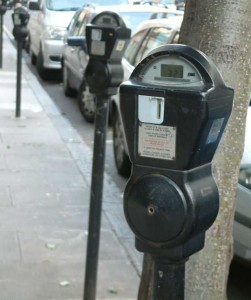Parking is the Gordian knot of municipal politics, especially in Cobourg. Truly, it could be any municipality.
Those involved like to pick at the individual threads of this tangled issue giving the impression it is being worked on, but it seems like it is never solved.
With some 2,238 spaces available in the downtown area, it almost seems incredible people cannot find a spot and happily use the retailers and services without complaint. And, what is even more mindboggling is through the week and on weekends, Cobourg is not coming close to using its effective capacity, according to a study presented to town council recently by its consultants.
Simply put, people use only two municipal parking lots through the week: Covert Street and Victoria Hall. Then, it is the on-street parking on the various roads like King Street, Division Street, Third Street, etc. The rest of the municipal lots and streets might as well be located in Oshawa for all that anyone really cares.
On the weekends, it is a different story. With the attraction of the Cobourg beach, every available lot is maximized as tourists and locals fight for a spot. What is truly amazing about this is the town’s efforts to put up as many barriers with parking meters and restrictions all around the beach area and still people are jamming the lots and streets in the area.
The bottom line is someone is going to pay for downtown parking, whether it is the businesses – at $25,000 per year – or customers or taxpayers – $120,000 initial cost for the new meters. Parking is not free.
The battle lines will be clearly drawn: those who favour “free” parking as an incentive to draw customers and tourists. Then, there will be those who want paid parking to transfer the costs away from businesses and taxpayers to users.
For those who want free parking, it makes sense. The malls already provide free parking, so people are accustomed to not paying when they shop. It is also a competitive disadvantage for the downtown
Also, the public already as a perception this is an important feature of the downtown, according to the study. Take it away and there will be a negative reaction and a potential loss of business.
Without regulation, free parking is abused. This happened in the past as employees used prime spots, while others park for the entire day. This meant transient customers looking for short-term parking for an hour or two cannot find convenient parking near shops and services.
Paid parking advocates see a chance to transfer costs to the users (aka customers), away from the businesses who currently subsidize the system. Using meters with a two-hour is the simplest solution. Port Hope does this now. This discourages long-term parking. The current permit system can be used for employees and owners.
For those who argue people will not pay, one only needs to look at the parking around the waterfront. Despite a myriad of barriers, including metered parking and various controls for on-street parking, people swarm to the beach every weekend, filling every available space.
If customers are motivated sufficiently, they will pay. Is the parking debate a crutch for businesses who have difficulty attracting customers?
Having a tiered system is best, making sure those who wish to pay to park right in front of a store on King Street pay a premium, but those who are prepared to walk a bit say from McGill or Trinity lots, get a price break.
Still, no matter the strategy and regardless of the final decision, there will not be peace on this subject. Surely as God made little green apples, this issue will be back on the agenda in a few years.
What is always strange is to think when one visits Toronto how far a person must walk once they park. Why is it we can suffer this, but not a few extra steps in Cobourg?
Local politicians will need to take a lesson from Alexander The Great by simply cutting the knot swiftly rather than a holding a protracted debate. In this case, being decisive may not make everyone happy, but there is no compromise that will not leave someone upset and the current system just doesn’t work.
Originally appeared Sept 25, 2013



